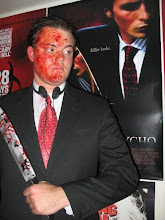Billed as a guidebook for internet subcultures, Zack Parsons' "Your Next-Door Neighbor Is A Dragon" is exactly the sort of book I'm prone to ignore.
It's 2009. The last book I read on the subject of the internet was in the mid-nineties, and it contained mostly theories on the direction the internet could take if it "caught on". And Moore's Law makes any printed evaluation of the internet instantly anachronistic. What about a book on weird internet subcultures? Again, it's 2009. My generation grew up mocking the bizarre forum posts of furries, voraphiles, and slash fiction writers. These concepts have little mileage left for shock value.
Thankfully, Parsons is uniquely qualified to approach the subject from a fresh perspective. As one of the main writers on SomethingAwful.com, he's spent the last decade mocking internet stupidity on a daily basis. Thinking back now, I realize my introduction to many of these subcultures came originally through his work (I'm positive SA's "Horrors Of Pornography" introduced me to vore). Rehashing the details of these lifestyles would bore his audience, so Parsons goes where his audience never would: the real world.
The result is a darkly absurd bit of gonzo journalism that I couldn't put down.
This is not a guide to the internet, as much as a foray into post-internet studies. For example, consider the improbable event that tomorrow morning you awake to the realization "I am a dragon." A mere decade ago, you may have sought psychological counseling or simply buried your feelings in the same dark recesses of your soul where you hide Crash Test Dummies trivia and your dreams of interpretive dance. You would have suffered a secret burden and lived in fear of discovery. It's 2009. Type "I am a dragon" into a search engine and you'll find hundreds of Dragonkin communities, where like-minded people/dragons will encourage you, provide support, and never call you a lunatic. These are your new friends and this is your new lifestyle.
In a world where any concept can easily find supporters, the horrifyingly improbable can flourish. Transition sentence here. Ron Paul. Point proven.
Parsons journeys across the country, observing the average day of people who inhabit the fringe. Tosh.0's Web Redemption uses a similar conceit, but Youtube stars exist because they crave attention, and therefore are exponentially less interesting than the reluctant subjects presented here. Some could never be accepted because their self image has no real world correlation, like the Dragons, and the super powered Elf who lives in a trailer park with his mother. Others exist merely to forward a message, like the neo-Nazi webmaster who floods local dating services with like-minded women to help grow the cause. Some are dangerous to others (a crazed religious militia) or want to help make the world a better place (the writer with VR 5/Alf/The Nanny slash fiction, or Ron Paul). Those only protecting themselves can find peril on the wastelands of the internet, as the chapter on cyberchondira shows: Self Diagnosed Aspergers, or "internet aspies", is a great way to be a dick but not have to accept responsibility.
The strength of the book comes from Parsons casting himself as the main character. After building a career on mocking e-losers from the safety of his laptop, he's now thrown into their midst. He gains some measure of understanding, and in rare moments can even feel emotional connections, but still serves his main purpose as voicing the reader's questions. Mostly "Why?". Subjects who have heard that question their entire lives develop intriguing logic to support their responses, and Parsons never hesitates to call bullshit. Unless it's funnier to play along.
This book is not a true story, but it is an excellent work of modern gonzo journalism. Just like Hunter S. Thompson, it's impossible to tell what's real and what isn't (mostly), but the ideas are all true, so what else matters? Each person featured has a real world equivalent, or is an amalgram of several Parsons researched. It is a fitting format for the subject matter, and allows a more accurate and relevant profile of subculture life than a biography of any real member, and assuredly more facts than the individual Wikipedia entries.
It's a comical edu-venture which paves the way for my e-dystopian future, where societal norms are governed by forum moderators and there's a Confurvative (furry + conservative) in the White House. I hope he's a huge purple kitten.
As the introduction says:
We know that the Internet isn't just perverse and obscene: it's actively creating crazy people. Isn't it great? It is like Caligula's brain swimming around in a fish tank. We don't want to jump in, but holy shit, we sure do love to tap on the glass.
Easily the best quote to use when starting a new blog.
